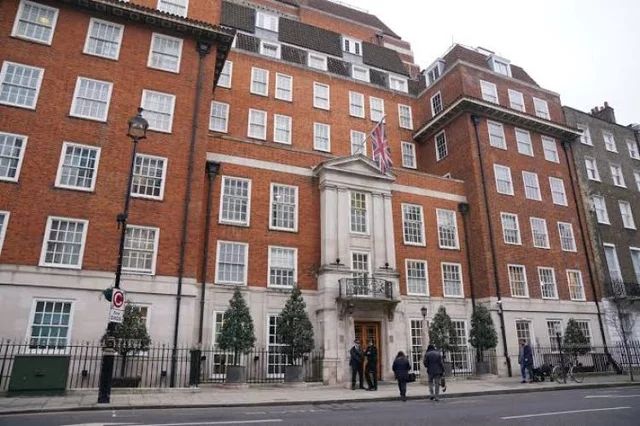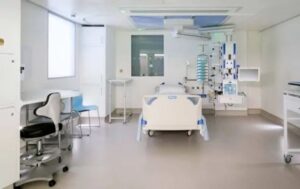
The London Clinic, one of the United Kingdom’s most elite private hospitals, has drawn intense public interest following the death of Nigeria’s former President, Muhammadu Buhari, who passed away at the facility on Sunday, July 13, 2025.
Sources confirmed that Buhari died after suffering a sudden relapse while preparing for discharge. He had reportedly been in high spirits the previous evening, according to his nephew, Mamman Daura. “I left him around 9pm on Saturday. He was looking forward to his doctor’s visit the next morning. Unfortunately, by midday Sunday, he began to experience breathing difficulties. Despite efforts by doctors, he died at about 4:30pm,” Daura told ThisDay.
Buhari, who had travelled to the UK in April for what was described as a routine medical check-up, had long battled undisclosed health issues. He reportedly spent his final days in the hospital’s Intensive Care Unit, where treatment is estimated to cost between N6 million and N7 million per day.
His death was officially announced by his former spokesperson, Mallam Garba Shehu. “The family of the former president has announced the passing of Muhammadu Buhari this afternoon in a clinic in London. May Allah accept him in Aljannatul Firdaus,” Shehu stated.

The London Clinic: A Hospital for the Global Elite
Founded in 1932, The London Clinic, located on Harley Street in London’s medical district, is renowned for its advanced medical technologies and ultra-specialised services, including robotic surgeries and cancer care. The hospital boasts 13 ICU beds, 10 operating theatres, and caters to over 120,000 patients annually, including political leaders and British royals.
Consultations at the facility range from £100 to £750. CT scans cost around £500, while major surgeries are priced between £10,000 and £13,000. Private rooms cost from £1,000 to £2,500 per night, and ICU admissions are billed at £3,000 to £3,500 daily.
The hospital’s latest technology includes robotic surgery platforms like the da Vinci Xi, ExcelsiusGPS, and NAVIO systems. It also features advanced diagnostic equipment such as 3 T MRI, PET-CT, digital mammography, and multiple CT scanners.
Medical Tourism and State Responsibility
Though it is unclear who covered the cost of Buhari’s treatment, the Remuneration of Former Presidents and Heads of State Act mandates the Nigerian government to fund medical care for former presidents, both locally and abroad.
This revelation has reignited the debate over the country’s persistent dependence on foreign hospitals, despite massive investments in domestic medical facilities. In 2021, Buhari approved a N21 billion Presidential VIP Wing at the State House Clinic, with at least N10 billion reportedly disbursed by 2022. Still, top officials, including President Bola Tinubu, continue to seek care overseas.
Findings show that over a 16-year period, the Federal Government spent an estimated N13.4 billion on medical travel for Buhari, Goodluck Jonathan, and Umaru Musa Yar’Adua. Buhari alone spent 225 days on medical trips during his presidency, visiting the UK multiple times between 2016 and 2022.

Outrage from Nigerian Medical Bodies
Medical professionals have strongly criticised the country’s leadership for neglecting Nigeria’s healthcare system.
Dr. Tope Osundara, President of the Nigerian Association of Resident Doctors (NARD), described the foreign medical patronage as “a betrayal” of Nigeria’s health sector. He said, “It’s like building a company, then refusing to use its products. Buhari once advocated against medical tourism, yet he died in a foreign hospital.”
Dr. Osundara also dismissed remarks by former presidential spokesman, Femi Adesina, who claimed Buhari might have died earlier if treated in Nigeria. “That’s a false and dangerous narrative. Nigerian doctors are competent but lack the infrastructure,” he said.
Nigerian Medical Association (NMA) President, Prof. Bala Audu, said the reliance on foreign hospitals reflects the government’s lack of confidence in its own investments. “Healthcare is personal, but public officials should lead by example. Their actions tell the public that Nigerian hospitals aren’t good enough,” he stated.
He highlighted the need to prioritise healthcare personnel, maintain equipment, and improve workplace environments for medical professionals.
Prof. Muhammad Muhammad, President of the Medical and Dental Consultants’ Association of Nigeria (MDCAN), also stressed the need for the government to invest in local health infrastructure. He called for strategies similar to those used in India and Egypt to grow super-specialty private hospitals through tax waivers, duty exemptions, and low-interest loans.
A Legacy of Medical Absences
Buhari was not the only Nigerian leader to seek healthcare abroad. The late President Umaru Musa Yar’Adua spent 109 days overseas for treatment, while Goodluck Jonathan also embarked on extensive foreign trips during his tenure.
Buhari’s death at The London Clinic has once again cast a spotlight on Nigeria’s struggling healthcare sector, reviving calls for urgent reform and an end to the culture of medical tourism among the country’s elite.











